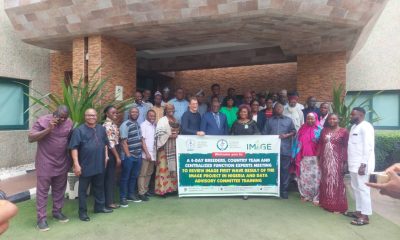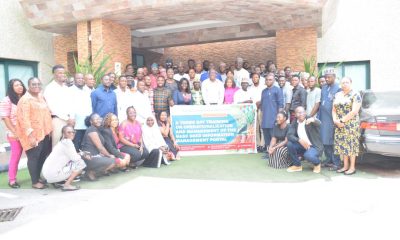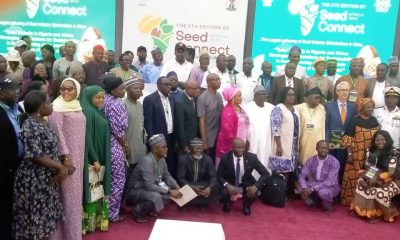Agriculture
NASC Reiterates Commitment to Building Resilient Seed System in Africa
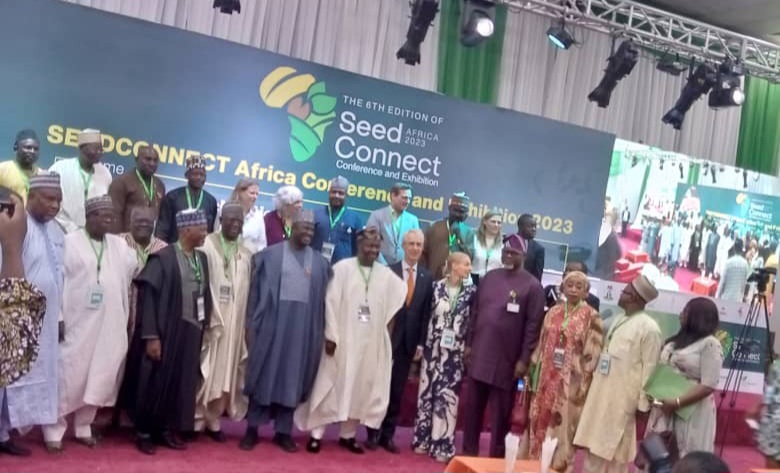
- Laments challenges of conflicts on global economy
- Vows to ensure Africa’s Food and Nutrition Security
The National Agricultural Seeds Council NASC, has on Tuesday, reiterated commitments to building a viable and resilient seed system in Africa regardless of the conflicts and challenges currently impacting negatively on food security.
The Ag Director-General of the council, Dr. Ishiaku Khalid, who made this known on Tuesday, during his opening/welcome address at the 6th Edition of SeedConnect Africa Conference/ Exhibition 2023 held in Abuja, stated that it is dedicated to the Global Declaration of Food Emergency and the role of Africa’s Seed Sector in creating a sustainable food system to ensure access to nutritious and affordable food both now, and in the future.
Ishiaku noted that whilst Africa is yet to fully recover from the detrimental impact of COVID 19 pandemic, the Russia-Ukraine conflict has posed another major threat to the global economy with many African countries being directly affected.
“The conflict is currently impacting negatively on food security in Africa by disrupting the availability and pricing in some food crops, particularly wheat and sunflower which may have its multiplier effect on other crops thereby disrupting the global production and supply chain system. Today, in Nigeria, we are witnessing new levels of threat, the food security situation is critical and has been impacted over the years by several factors especially by violent conflicts including the various levels of insurgency, armed banditry, the perennial farmer header conflicts, and separatist agitation across the country; other factors include rising inflation, rising poverty, and rising unemployment; Natural Disasters and other consequence of climate change impact. All these factors, continue to affect food production and availability of food engendering and compounding a cost-of-living crisis with severe effects on the cost of living of citizens and their ability to access food. The 6th edition of SEEDCONNECT 2023, is seeking a new level of freedom and change to mitigate these impacts and build a resilient seed system in Africa.” He added.
The Ag DG, emphasized that SEEDCONNECT Africa, has contributed immensely to the growth and development of the Nigerian Seed Systems as a result of the laudable contributions made by Stakeholders over the years.
Speaking further, Dr. Ishiaku, outlined few achievements of the council as a result of the implementation of brilliant ideas, decisions and innovation.
• “The amendment of the NASC Act. This has a flurry of innovations to bring us par with international best practices. This includes the introduction of stiffer penalties and solid foundation for the introduction of technology to police the Seed Industry. Under its Market Surveillance and Enforcement of Seed Quality Standards, NASC has seized substantial quantity of various crops seeds and varieties from unscrupulous seeds dealers nation-wide.
• The Introduction of a Turn-Key Electronic Seed Authentication System tagged ‘SEEDCODEX’ is fast becoming relevant in the Seed Industry as majority of the Seed Companies have fully subscribed to its implementation. With this, farmers are sure of using the right seed which has passed through the quality assurance processes of the NASC
• The NASC, through PVP Office is in the final stages of completing Nigeria’s membership process of the International Union for the protection of New Varieties of Plant (UPOV)
• Strengthening of the community based seed systems to provide the needed quality seeds to the hinter parts of the country. The systems is been formalized as we aim to reduce the quantity of seed exchange under the informal seed systems. NASC is working with partners such as ICRC, ATASP, Mercy corps, IITA, IFAD VCDP and a host of others to strengthen the system.
• Nigeria’s membership of the OECD Seed Scheme as the 62nd state thereby facilitating our access into the international seed market
• The current review of the Seed policy with the support of USAID Feed the Future Agribusiness has been approved by the National Council for Agriculture and Rural Development (NCARD).
• Our efforts to trace and track variety adoption through the introduction of DNA fingerprinting technology under the IMAGE project is currently ongoing. The first wave of the survey has been conducted. Seeds varieties have been drawn from farmers and other Stakeholders for DNA analysis.
• Diagnostic Certification and Molecular Analysis: NASC has continued to conduct various diagnostics analysis on virus indexing of Africa Mosaic Virus (ACMV), East Africa Cassava Mosaic Virus (EACMV) and Cassava Brown Streak Virus (CBS). This is to ensure viral free planting materials for vegetative propagated materials.
• Third-Party Certification: NASC initially engaged and trained about 74 Licensed Seed Inspectors (LSI) in five states namely Benue, Kogi, Abia, Imo and Oyo to carry Third Party Certification to compliment the services of NASC Certification Officers in aforementioned states under collaboration with BMGF sponsored BASICS project. The success of this led to engagement of 14 more LSI through scaling up to rice maize and potatoes by the Dutch Government Funded Collaborative seed project. The standard operating Protocols has been developed to guide their operations.”
He however tasked participants, other stakeholders to initiate, think up new ideas and innovations to move the African Seed Industry forward in tackling the global economic and food security challenges capable of bringing about the needed transformation in the Agricultural space.
Meanwhile, the chairman of the House Committee on Agricultural Production and Services, Hon. Bello Kaoje, commending the council, stakeholders for their dedication and commitment, also emphasized that the process will strengthen the spirit of collective partnership towards achieving food security.
He pledged commitment of the parliamentarians in ensuring and working towards the best interest of the citizenry.
Agriculture
South-West Cassava Farmers Enhance Skills Through AATF Training in Oyo
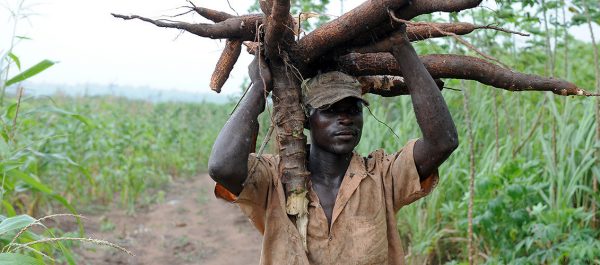
Approximately 1,000 cassava farmers and processors from the South-West region have participated in a training program focused on Good Agronomic Practices to enhance their skills in cassava farming and processing. This initiative was announced by Adeyemi Olojede, the Director of Tuber Crops Research at the National Root Crops Research Institute (NRCRI), during the program’s official launch at Fashola Farm in Oyo town, Oyo State.
Olojede noted that the program, organized by the African Agricultural Technology Foundation (AATF), aims to reach over 6,000 farmers, with particular emphasis on empowering women and youths. He expressed optimism that the initiative would significantly improve cassava farming and processing in Nigeria, equipping participants with essential skills to enhance their livelihoods through better production methods and increased value creation.
“This weeklong training, facilitated by the NRCRI, kicked off with the first batch of 1,000 participants, comprising farmers and processors,” he stated. The program is supported by the German Federal Ministry for Economic Cooperation and Development and implemented by Deutsche Gesellschaft für Internationale Zusammenarbeit GmbH in collaboration with AATF, Agridrive Ltd., and Clayuca Corporation.
Olojede revealed that this training marks the initial phase of a series expected to unfold over three years, with plans to train 1,000 participants in 2024, 2,000 in 2025, and 3,000 in 2026. The program will also include training for 1,000 processors, mainly women from Oyo and Ogun states, focusing on enhancing value addition in cassava processing.
Kehinde Jimoh, AATF’s Programme Officer for Agribusiness, emphasized that the initiative is part of the foundation’s broader commitment to boost the productivity of cassava farmers and processors. He highlighted that the training aims to empower participants with best agronomic practices and value addition strategies, which are expected to lead to significant improvements in their livelihoods and cassava productivity.
Jimoh also noted the importance of this training in not only boosting cassava production but also enhancing value addition, providing farmers with alternative income streams.
Agriculture
Wema Bank Shines at Global SME Finance Forum Conference Awards 2024
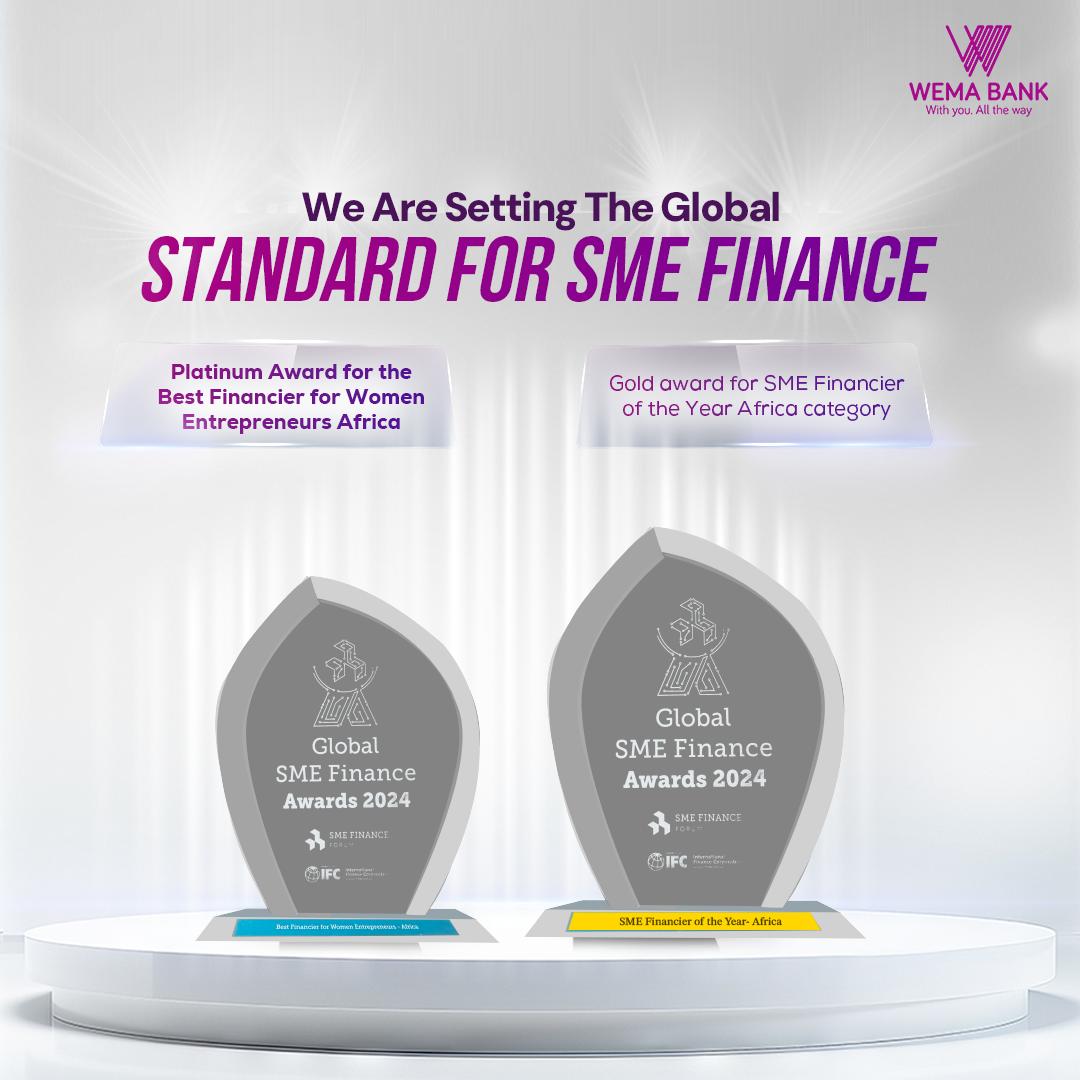
…Awarded:
• SME Financier of the Year (Africa)
• Platinum Award for Best Financier for Women Entrepreneurs (Africa)
Wema Bank, Nigeria’s foremost innovative bank and pioneer of Africa’s first fully digital bank, ALAT, has received two awards of excellence at the Global SME Finance Forum Conference Awards 2024 which held in São Paulo, Brazil between September 16 & 18, 2024. The awards received are SME Financier of the Year (Africa) and Platinum Award for Best Financier for Women Entrepreneurs (Africa).
The Global SME Finance Forum is the world’s leading, technically oriented and geographically diverse platform focused solely on scaling SME financing worldwide. Managed by this Forum, The Global SME Finance Forum Conference Awards is dedicated to acknowledging the effective and successful practices of financiers across the world, honouring the innovative products and services these financiers create for SMEs, recognising the impressive results in expanding finance and services to SMEs, and celebrating these exceptional financial institutions. Wema Bank emerged Africa’s top financier not just for the general SME landscape but also particularly for women-owned SMEs, at the 2024 edition of the annual Global SME Finance Forum Conference Awards.
Reputed as the Bank of choice for Micro, Small and Medium Enterprises (MSMEs), Wema Bank received recognition for its commendable track record of developing innovative, sustainable and significantly impactful products, services, solutions and opportunities for businesses of all sizes across Nigeria. The Bank’s impact ranges from affordable financing options and seamless payment collection solutions to access to market, digital solutions for efficient business operation and management, SME Advisory services, and a vast range of products tailored to the needs of businesses across every part of Nigeria. Through its women-focused proposition, SARA by Wema, Wema Bank continues to tailor its SME offerings specifically for women, helping these women build sustainable businesses and access the resources needed to scale and thrive. The Bank further supports overall growth and well-being of these women with affordable to free healthcare packages. It is beyond doubt that Wema Bank is indeed deserving of its recognition as Africa’s top financier for SMEs and particularly, women entrepreneurs.
Expounding on the Bank’s glaring commitment to empowering MSMEs, the MD/CEO of Wema Bank, Moruf Oseni, articulated the big picture for the Bank. “MSMEs make up the bulk of Nigeria’s economy and they are critical to not only mitigating unemployment and other macroeconomic challenges but also promoting innovation and significantly boosting the economy towards national development. At Wema Bank, we recognise the potential that MSMEs hold as well as the challenges that threaten the maximisation of this potential, and we have made a lifelong commitment to providing viable, seamless, accessible, affordable, reliable and effective solutions tailored to the needs of businesses of all sizes across Nigeria; especially women-owned businesses. There is a rising need for intentionally inclusive empowerment strategies in not only stimulating growth in the SME sector but also bridging the gap in gender equality, and we have undertaken the responsibility of fulfilling that need. As a Bank, our mission is to empower lives through innovation, and as always, we will continue to seek more effective ways to empower businesses for optimal productivity and sustainable growth”.
“We are honoured by the global recognition accorded to us by the Global SME Finance Forum and as we receive these awards, we reiterate our commitment to providing businesses with the resources they need and a bouquet of intelligent solutions that mitigate prevalent challenges and make business management and operation seamless, maximally profitable and efficient. Thank you to the Global SME Finance Forum for the acknowledgement, and also to our valued customers who continue to entrust the future of their businesses and their financial well-being in our hands. This prestigious recognition honours our unwavering commitment to empowering SMEs and fostering innovation in SME finance, further fuelling our drive to consistently go above and beyond in accelerating growth for SMEs and delivering optimum value to every stakeholder. We are indeed the Bank of choice for MSMEs and women across Nigeria, and we will never relent in empowering women to thrive and businesses to scale regardless of economic fluctuations”, Oseni remarked.
Wema Bank continues to raise the standards of banking and financial services in Nigeria, demonstrating a commitment to generating positive impact across diverse verticals, a dedication to exceeding expectations and a passion for empowering lives and businesses for success.
Businesses interested in accessing the Bank’s tailored range of finance options and business-centric solutions are encouraged to visit https://wemabank.com/smes or send an email to smehelpdesk@wemabank.com to get started.
Agriculture
Experts Call for Harmonization of Gene Banks to Boost Agricultural Productivity
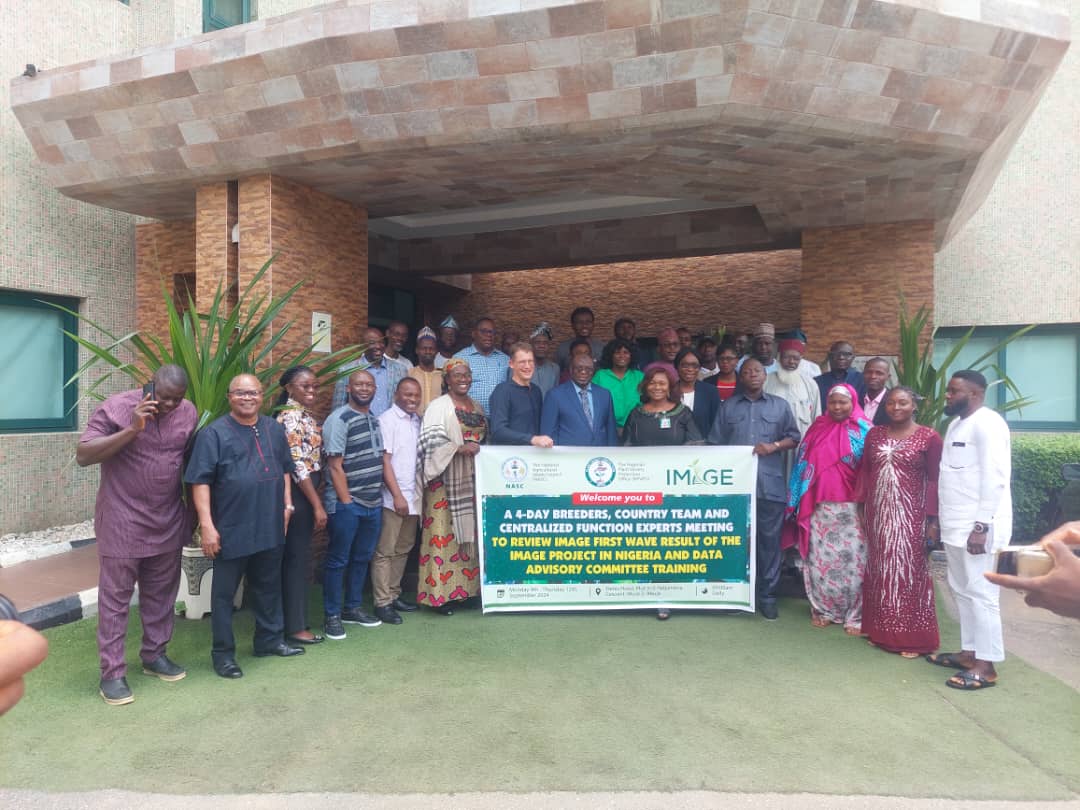
- …Stresses the importance of genetic diversity in agriculture
- …Advocate for improved genetic reference libraries
Experts in the agricultural sector on Monday, emphasized the need for harmonization of gene banks in Nigeria to enhance the country’s agricultural productivity.
The call was made at the opening of a 4-day Breeders Country Team and Centralized Function Expert Meeting, organized by the National Agricultural Seeds Council (NASC) in collaboration with the Nigerian Plants Variety Protection Office (NPVPO) amongst other partners.
The meeting aimed to review the first wave results of the Institutionalizing Monitoring of Crop Variety Adoption using Genotyping (IMAGE) project, which seeks to improve crop productivity and enhance genetic diversity in Nigeria.
Speaking to newsmen, Dr. Ishiak Khalid, Acting Director-General of NASC, stressed the importance of harmonizing gene banks to support the country’s agricultural development.
He said; “Harnessing the potential of our genetic resources requires a coordinated approach. By harmonizing our gene banks, we can ensure that our research institutions are working together to develop improved crop varieties that meet the needs of our farmers.”
Dr. Khalid encouraged research institutions to prioritize research on improved seed varieties, highlighting its impact on farmer yields. He praised plant breeders and crop experts for their achievements, stating that their expertise and commitment have been instrumental in driving agricultural progress.”
Also speaking, Prof. Lucky Omoigui, Seed System Specialist from the International Institute of Tropical Agriculture (IITA), stressed the crucial role of quality seeds in boosting crop productivity.
“Quality seeds are the backbone of productive agriculture, and to increase crop yields, we must ensure farmers receive seeds with the right genetic material. This requires rigorous testing and verification against reference materials.”
Omogui further emphasized the importance of maintaining robust seed banks. he said “A well-managed seed bank is vital for preserving genetic diversity and ensuring seed quality. Continuous use of seeds without replenishment from reserves leads to quality degradation.”
Meanwhile Dr. Folarin Sunday Okelola, Acting Registrar of the Nigerian Plant Variety Protection Office (NPVPO), presenting a paper titled “Crop Survey Results: Nigerian Cassava, Revised Genotyped Crop Survey based on the Cluster Pipeline Bioinformatics Pipeline.” reiterated that the essence of the meeting is to adopt and advise farmers on effective seed systems.
Okelola urged stakeholders to consider opportunities for improving access to quality seeds, maintaining seed purity, enhancing genetic reference libraries, and conducting analysis to characterize genetic entities and unidentified samples
According to him, ongoing and regular analysis based on growers’ reports and genetic features will help understand what farmers are planting.
He however, encouraged research institutions to conduct further studies to comprehend genotyping and the clustering pipeline, which can be effectively applied in dynamic seed systems with uncontrolled variation in outcrossing crops, where genetically diverse Open-Pollinated Varieties (OPVs) predominate.
-

 Business10 hours ago
Business10 hours agoOkpella Monarch: Obaseki Ratified Kingmakers Decision, End 5years leadership Vacuum
-

 News21 hours ago
News21 hours agoDemolition: Press Under Siege As Taraba Govt Issues Ban Memo
-

 Banking6 hours ago
Banking6 hours agoFree Food Saga: Akpabio quoted out of context-CSO
-

 Foreign10 hours ago
Foreign10 hours agoSci-tech innovation fuels China’s high-quality development
-

 Foreign10 hours ago
Foreign10 hours agoSWChina’s Guizhou builds itself into computing power base serving whole country
-

 Foreign4 hours ago
Foreign4 hours agoQinling Mountains better safeguarded with comprehensive digital platform
-

 Business3 hours ago
Business3 hours agoShehu Sani Criticizes World Bank Over Nigeria’s Economic Outlook
-
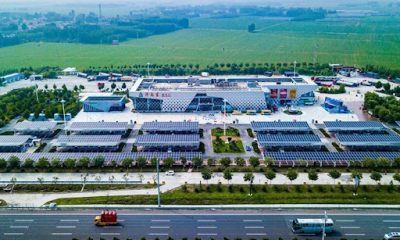
 Foreign4 hours ago
Foreign4 hours agoExpressway service station in Shandong achieves carbon neutrality

